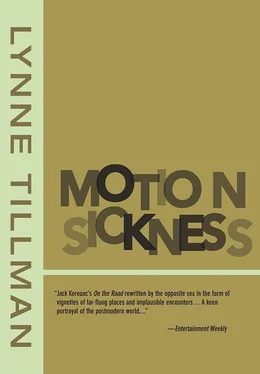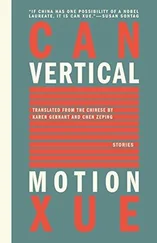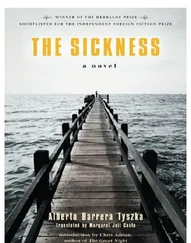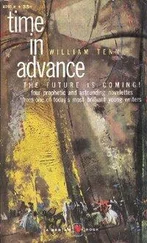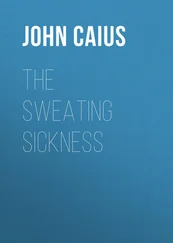If I spoke French, I’d cherish the word dégoût and use it often, closely followed by dérive . Disgust and drift. In French they’re nearly liquid on my tongue, but maybe they’re not on French tongues. French tongues give French kisses — what are they called here? — rouler une pulle , Arlette tells me. To shovel a big one, to roll a big one. It’s a more ugly image than I expected. Soul kiss is lovelier than shoveling a big one. Although you can turn your tongue into a shovel if you can flex your tongue at all. Tongue here is langue , the same as language. Mother tongue would be redundant, I suppose. I’ll ask Arlette some day. The French call French letters lettres anglaises . They must have been sending letters back and forth across the English Channel way before the passport came into existence. Unfettered intercourse, or fettered intercourse with letters. They must be called letters because they were carried in envelopes, so the condom itself is like writing paper, to be wrapped around the stylo —pen — whose destination is a mailbox, or just box. We use the tongue in a French kiss, something that I’m not sure comes naturally, at least I believe I learned to do it in grade school. Dé-goût . Dis-gust: far from gustibus : pleasure. But disgust isn’t far from pleasure, it’s pleasure’s other side, or twin. Being a twin must be disgusting, pleasurable.
I tell Arlette New York is like Paris. That’s probably not so. Days turn into nights here the way they do in New York. The cities never sleep. Cities don’t sleep. Apart from friends and my block, or the skyline, as familiar and remote as Marilyn Monroe’s figure, different neighborhoods are convincing real-life locations for movies I’ve seen. Or the city is posters, a backdrop of images and words. Delis with pictures on their walls and violent acts preceded by screams for help, take-out coffee in Greek-motif paper cups and high-school kids cracking up on subways, buses driven by witty drivers, passengers with inflamed passions, shoppers suffused with envy and hope fed by advertisements on TV, doped-up guys selling grass or coke, distraught people on the street asking for money, holding cardboard signs with sad stories, impressive shops at the base of enormous buildings, young guys hanging out in doorways listening to music. Long walls are invaded by a pervasive street humor that catches you listening to it, the city’s laugh-track. I don’t really see New York. Or when I see it, it’s always the same. I can’t see it. Or for that matter America. Just the way I don’t see Paris. Or Europe. It’s inaccessible to tourism, or it’s all tourism.
* * *
Every day is a little like this one, somewhat repetitious, with a beginning, middle and end that’s concocted of temporary habits or rituals, and a dash of discovery that appears to make it new. A bowl of café au lait and a bevy of alien characters, a newspaper’s list of new and old movies, elegant displays in charcuteries . I walk miles and miles, wearing out shoe leather — as my father would say — because shoes always wear out. I sit in obscure cafés, neighborhood places that serve only one dish at lunchtime — today, blanquette de veau —where everyone seems to know the owners who do the cooking. And today I sit down in this out-of-the-way café and look at my book, No Pockets in a Shroud , then at Libération , and order the plat du jour . People are speaking French and I can’t eavesdrop. I watch. They gesticulate. They purse their lips, sucking in their cheeks. They may be saying a word like dégoût which forces that puckering. American mouths speaking English are horizontal slashes across full faces with heavy chins and jaws. Not all of course.
I like blanquette de veau . Jessica hates meat and hasn’t eaten it in twenty years. Arlette scoffs at vegetarianism and says we are animals and do what animals do. A small shadow falls on the white napkin that covers the basket of pain on my table. Someone is standing there. A small animal. I don’t want to look up. It may be someone I don’t want to see — from the undead past, an ex-lover, my ex-best friend. The shadow waits patiently. And finally I do look up and am pleasantly surprised, as they say. Because it’s Belgian Sylvie from Amsterdam. Chérie , Sylvie exclaims, formidable . It’s amazing to see you. I never thought it would happen. It is fantastic. She sits down, kisses me on both cheeks, and we order a bottle of wine. That is, she does. I like Paris, Sylvie says as the café’s only waiter walls off, but Parisians are funny about my belge accent.
She’s thinner, more like a delicate bird than before, but just as childlike. Perhaps I need to cast her as grief-stricken and incapable of nourishment, neither of which she is. She’s in Paris, she tells me immediately, with her husband, the German record producer, and their child. They’re staying in this district — the 12th — at a business friend’s apartment. She lights a cigarette and glances about nervously. She wants to talk about Sal but first she asks me where I’ve been. Since Amsterdam. I say I saw my friend Pete in Tangier who told me the terrible news about Sal. Her eyes drift and she observes, with one rush of breath, that now it all seems unreal and anyway it was hard for her to believe him. He said so many things and at the end she thought he must have wanted to die, the way he lived, because he was always looking for trouble. She says, He made trouble. Sal had a big imagination. And grand ideas. When they came to me and told me he has been murdered, it seemed I knew already, in one moment, I already knew it, a déjà vu. But you know Sal’s type better. One American to another.
I roll my eyes, speaking the only French I’ve been able to pick up, and hope that I’m doing a fairly good imitation of Arlette. I study Sylvie. She could be Arlette’s child or sister. They share no common features and I’m twisting them into homologous shapes. Which I’ve done before, devising little families of the unrelated. Families of the unrelated. Sounds like a horror sitcom. She moves in her chair, tapping her foot as if there were music playing. She says she always needs to move.
I know what she means. If Sylvie had to be told about Sal’s death, then he must have been murdered when he was with a woman who wasn’t Sylvie. Unless Pete had it wrong and there had been no woman with Sal. Or Sylvie may be lying to me, not wanting to appear to have been an accessory to his murder. Sylvie’s shaking her leg under the table and dragging hard on her cigarette.
But what about your study of the prostitutes? She puts out her cigarette. Since she fantasized about being a prostitute, she explains, she decided she couldn’t write it from a distance, like a documentary. It had to be a novel or story. And even though she never was a prostitute, in the story she will be. She’ll write it in the first person. She says, It is more a real voyeurism that way. Sylvie swallows some more wine. But now that Sal is dead, I am too sad and shaky, so I stop for the moment. My husband has been wonderful. Very sympathetic. She says she’s taking dance and I should come with her to one of her classes, taught by a Japanese couple. She likes dance because it’s about the body. It is what we have, she murmurs and then pauses. Murder is terrible. Death is terrible.
Death is terrible. A while ago, my father died, and life changed. It’s strange to say it like that, but Sylvie nods her head, purses her lips and sips her wine thoughtfully. It’s been ages since I’ve told anyone how my father died, and though I talked to Jessica about it, a little, I didn’t give her a detailed account. How the doctors worked on him for an hour, how he was awake and with the doctor he knew, even smiling, because he didn’t know what was happening, how he went into a coma, how he suffered irreparable brain damage, how he didn’t open his eyes again, how he lay attached to a machine and seemed dead already, but then when he was dead, I realized that he hadn’t looked dead. How I touched his cold hand and hoped that it’s true that people in comas know you’re there, how my mother stood silently beside him and finally turned her back, her hand to her mouth, how we weren’t there when he actually died, how his embalmed body looked, how, at the funeral home, I noticed a slight mark on his forehead that wasn’t there before, a bruise high on his brow that showed he’d been handled badly, how the doctors said they did everything they could, how he was cremated in a place no one visited, how we tossed his shards into the sea, a few of us, how he would’ve gotten seasick if he’d been alive, how I became seasick, the boat rocking, rocking, rocking. The closing images frame it all, are freeze-frames, and like the eternity of death itself the images won’t die. They’ll die with me. When someone dies, I tell her, regaling her with unexpected lyricism, which suits my conception of Sylvie or an idea of Paris, death is like a one-way journey and it triggers in the ones who don’t die — it triggers an ordinary craziness. I pause. Sylvie screws up her face and asks gravely, What is triggers?
Читать дальше
